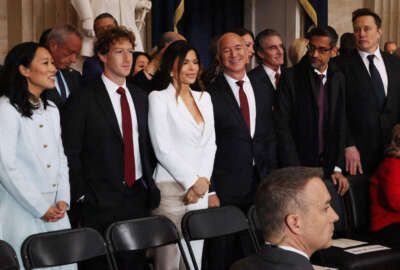Congress considers putting limits on drone strikes
Uncomfortable with the Obama administration's use of deadly drones, a growing number in Congress is looking to limit America's authority to kill suspected...
By LARA JAKES
AP National Security Writer
WASHINGTON (AP) – Uncomfortable with the Obama administration’s use of deadly drones, a growing number in Congress is looking to limit America’s authority to kill suspected terrorists, even U.S. citizens. The Democratic-led outcry was emboldened by the revelation in a newly surfaced Justice Department memo that shows drones can strike against a wider range of threats, with less evidence, than previously believed.
The drone program, which has been used from Pakistan across the Middle East and into North Africa to find and kill an unknown number of suspected terrorists, is expected to be a top topic of debate when the Senate Intelligence Committee grills John Brennan, the White House’s pick for CIA chief, at a hearing Thursday.
The White House on Tuesday defended its lethal drone program by citing the very laws that some in Congress once believed were appropriate in the years immediately after the Sept. 11 attacks but now think may be too broad.
“It has to be in the agenda of this Congress to reconsider the scope of action of drones and use of deadly force by the United States around the world because the original authorization of use of force, I think, is being strained to its limits,” Sen. Chris Coons, D-Del., said in a recent interview.
Rep. Steny Hoyer of Maryland, the No. 2 Democrat in the House, said Tuesday that “it deserves a serious look at how we make the decisions in government to take out, kill, eliminate, whatever word you want to use, not just American citizens but other citizens as well.”
Hoyer added: “We ought to carefully review our policies as a country.”
The Senate Foreign Relations Committee likely will hold hearings on U.S. drone policy, an aide said Tuesday, and Chairman Robert Menendez, D-N.J., and the panel’s top Republican, Sen. Bob Corker of Tennessee, both have quietly expressed concerns about the deadly operations. And earlier this week, a group of 11 Democratic and Republican senators urged President Barack Obama to release a classified Justice Department legal opinion justifying when U.S. counterterror missions, including drone strikes, can be used to kill American citizens abroad.
Without those documents, it’s impossible for Congress and the public to decide “whether this authority has been properly defined, and whether the president’s power to deliberately kill Americans is subject to appropriate limitations and safeguards,” the senators wrote.
It was a repeated request after receiving last June an unclassified Justice Department memo, which fell short of giving the senators all the information they requested.
First detailed publicly by NBC News late Monday, the memo for the first time outlines the Obama administration’s decision to kill al-Qaida terror suspects without any evidence that specific and imminent plots are being planned against the United States.
“The threat posed by al-Qaida and its associated forces demands a broader concept of imminence in judging when a person continually planning terror attacks presents an imminent threat,” concluded the document.
The memo was immediately decried by civil liberties groups as “flawed” and “profoundly disturbing” – especially in light of 2011 U.S. drone strikes in Yemen that killed three American citizens: Anwar al-Awlaki, his 16-year-old-son and Samir Khan. Al-Awlaki was linked to the planning and execution of several attacks targeting U.S. and Western interests, including the attempt to down a Detroit-bound airliner in 2009 and the plot to bomb cargo planes in 2010. His son was killed in a separate strike on a suspected al-Qaida den. Khan was an al-Qaida propagandist.
White House spokesman Jay Carney, echoing comments Brennan made in a speech last April, called the strikes legal, ethical and wise and said they are covered by a law that Congress approved allowing the use of military force against al-Qaida.
“And certainly, under that authority, the president acts in the United States’ interest to protect the United States and its citizens from al-Qaida,” Carney said Tuesday.
“It is a matter of fact that Congress authorized the use of military force against al-Qaida,” Carney said. “It is a matter of fact that al-Qaida is in a state of war against us and that senior leaders, operational leaders of al-Qaida are continually plotting to attack the United States, plotting to kill American citizens as they did most horrifically on September 11th of 2001.”
Three days after 9/11, Congress approved a law authorizing the military to use “all necessary and appropriate force” against al-Qaida and other groups believed to be helping or harboring the global terror network, including the use of drone strikes. In the decade since the attacks, U.S. intelligence officials say, al-Qaida has splintered into a number of affiliates and allied sympathizers. That means the current laws could allow military force against thousands of extremists across the Mideast and North Africa who have limited or no ability to strike the United States.
Currently, both the CIA and the U.S. military are authorized to remotely pilot unmanned, missile-carrying drones against terror suspects. It’s unknown exactly how many strikes have been carried out, but experts say that drone attacks in Pakistan are conducted by the CIA, while those in Yemen and Somalia, for example, are by military forces.
The drones have strained diplomacy between the U.S. and the nations where the strikes are carried out, as civilians have been killed alongside the targeted terrorists, even though most nations have given Washington at least tacit agreement to carry out the attacks.
A Middle Eastern diplomat said that in Yemen, for example, an uptick of U.S. drone strikes last month have killed dozens of people and upset the local public, leading some leaders in Sanaa to reconsider how often they should be used. The diplomat spoke Tuesday on condition of anonymity to avoid political retribution from the Obama administration.
The Pentagon is also considering basing surveillance drones in Niger to monitor on burgeoning extremist violence in North Africa, but it’s not clear if they will be armed. Scaling back the use of drones also would hamper war plans in Afghanistan after combat troops are scheduled to withdraw in 2014. Drones represent a major thrust of the post-troops campaign to help the limited number of special forces units that remain there keep the Taliban from regrouping.
Brennan, who currently serves as the White House counterterrorism czar, has signaled he is prepared to turn the CIA from carrying out lethal drone strikes and hand over those missions to the U.S. military. Sen. Ron Wyden, a senior Democratic member of the Senate Intelligence panel, declared himself unsatisfied Tuesday with the Justice memo and said he will press Brennan at the confirmation hearing about the administration’s current policy.
The drone debate puts Obama – himself a former civil rights lawyer – in the awkward position of carrying out lethal attacks in secret and bucking his political allies in the Democratic Party. Democratic lawmakers were incensed by the refusal of the Republican administration of President George W. Bush to hand over classified Justice Department opinions justifying the use of waterboarding, the harsh interrogation tactic that critics call a form of torture. Obama repudiated those methods – and released those opinions – when he took office in 2009. The use of drones proved to have no political cost to Obama in his re-election campaign.
House Intelligence Chairman Mike Rogers, R-Mich., defended the use of deadly drones, calling it “a lawful act of national self-defense.”
“When an individual has joined al-Qaida – the organization responsible for the murder of thousands of Americans – and actively plots future attacks against U.S. citizens, soldiers, and interests around the world, the U.S. government has both the authority and the obligation to defend the country against that threat,” Rogers said in a statement.
But Rep. Keith Ellison, said the new Justice memo could spur lawmakers into taking a fresh look at deadly drones, and what he called an outdated policy guiding them.
“We are sort of running on the steam that we acquired right after our country was attacked in the most horrific act of terror in U.S. history,” said Ellison, D-Minn. “We have learned much since 9/11, and now it’s time to take a more sober look at where we should be with use of force.”
—
Follow Lara Jakes on Twitter at: https://twitter.com/larajakesAP
Copyright © 2025 Federal News Network. All rights reserved. This website is not intended for users located within the European Economic Area.





